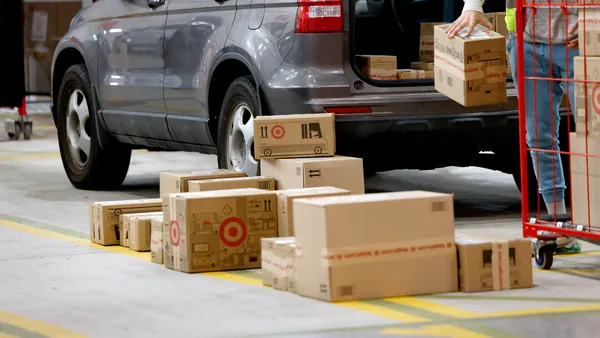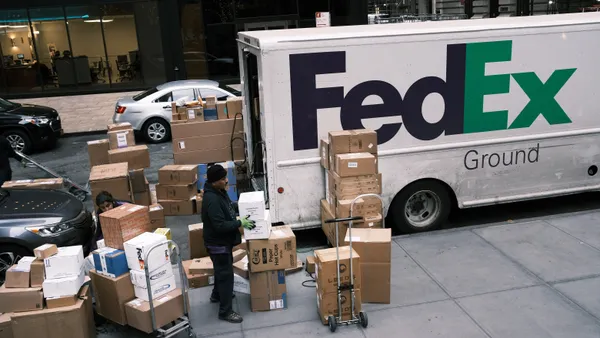Dive Brief:
- Expedited shipping costs to improve delivery times, along with the expected reverse-logistics costs of Peloton's recalls on treadmills, are chipping away at the fitness company's margins.
- Peloton added $15 million in expedited shipping expenses to its plan for the next quarter, "in part due to the Suez Canal blockage," CFO Jill Woodworth said on the company's Thursday earnings call. Peloton announced plans in its previous earnings call to spend $100 million to speed delivery, including the use of airfreight and expedited ocean.
- Two recalls were issued: one because touchscreens can fall and cause injury, another after more than 70 incidents were reported of adults, children or pets pulled underneath the rear of the treadmill. "As part of the recall, we will incur logistics costs to pick up return treads and [Tread+]," Woodworth said. The recalls and other associated costs are expected to decrease margins by 900 basis points this quarter.
Dive Insight:
Nearly every company selling a product has reported freight or logistics headwinds in this earnings cycle. The supply chain challenges are magnified for Peloton, as a producer of big and bulky items. And the recent recalls on treadmills will add to its logistics expenses.
Peloton's $100 million spend to expedite delivery did pay off. Wait times for its original bike have returned to pre-pandemic levels of one to three weeks, and Bike+ wait times are also shortening, Woodworth said.
Expedited shipping also allowed Peloton to deliver more products and reduce its inventory backlog, which resulted in revenue exceeding forecasts for the company's connected fitness segment. The segment's revenue was up 140% YoY. But margins declined 1,593 basis points, in part because of shipping expenses.
Woodworth said Peloton will put another $15 million into expedited shipping in its Q4 (April 1 to June 30) partially because of the vessel that became lodged in the Suez Canal, although she did not elaborate on the extent to which Peloton was affected by the blockage. Many of Peloton's products are manufactured in Taiwan, indicating container shipments more likely traverse the Transpacific to West Coast ports rather than via the Suez.
In February, Peloton executives said West Coast port congestion was impeding their ability to deliver on time. Thursday, Woodworth described port congestion issues as "acute."
Shipping expenses should begin to come down for Peloton as it clears its backlog. "We do not anticipate meaningful expedited shipping expenses in fiscal '22," Woodworth said. Plus, the company completed its acquisition of Precor and will begin to manufacturer products in the U.S. in the second half of the calendar year, further cutting transportation costs.
The next big cost on the logistics frontier for Peloton will be related to its recalls of treadmills. In a filing with the Securities and Exchange Commission, Peloton named recall-related costs including "the cost to move the Tread+ for those that elect that option." Big and bulky last-mile deliveries are costly to begin with; the reverse logistics are no different.
Peloton mostly relies on third parties to execute last-mile deliveries and will have to employ the help of its partners to move recalled treadmills out of consumer homes, if the consumer elects for a return.
"If any of these independent contractors, or the last mile partner as a whole, do not perform their obligations or meet the expectations of us or our Members, our reputation and business could suffer," Peloton said as a risk factor in its filing.













